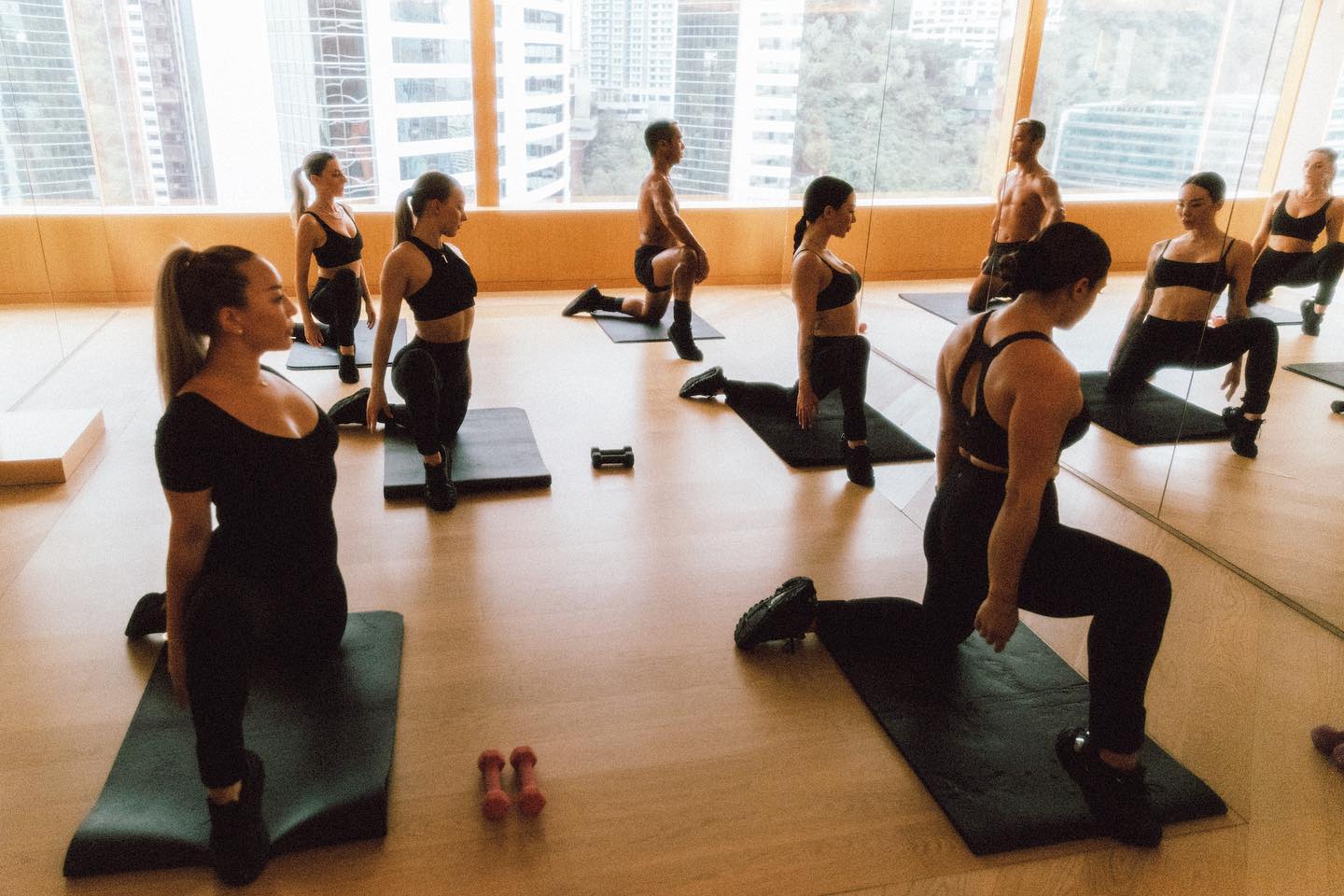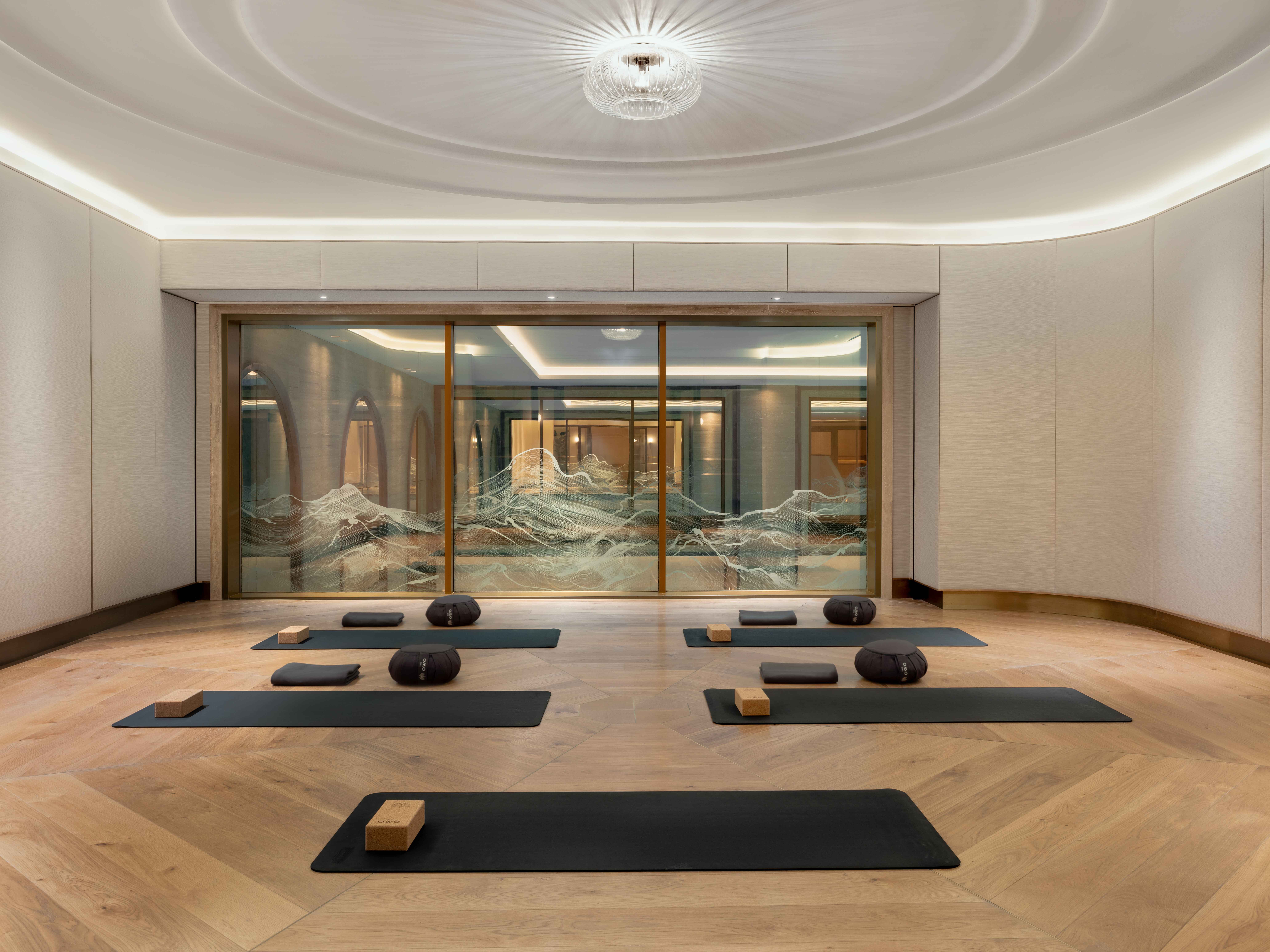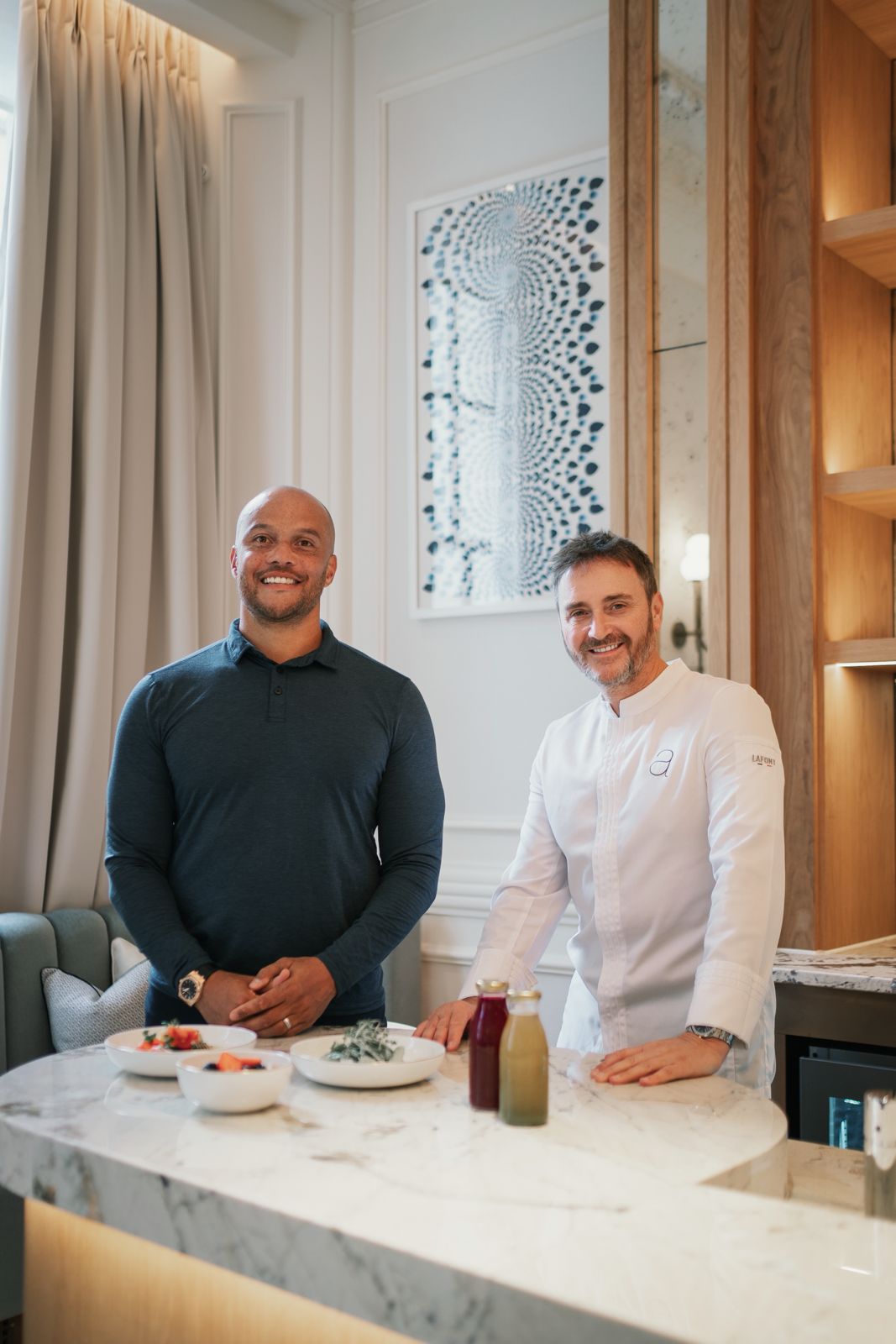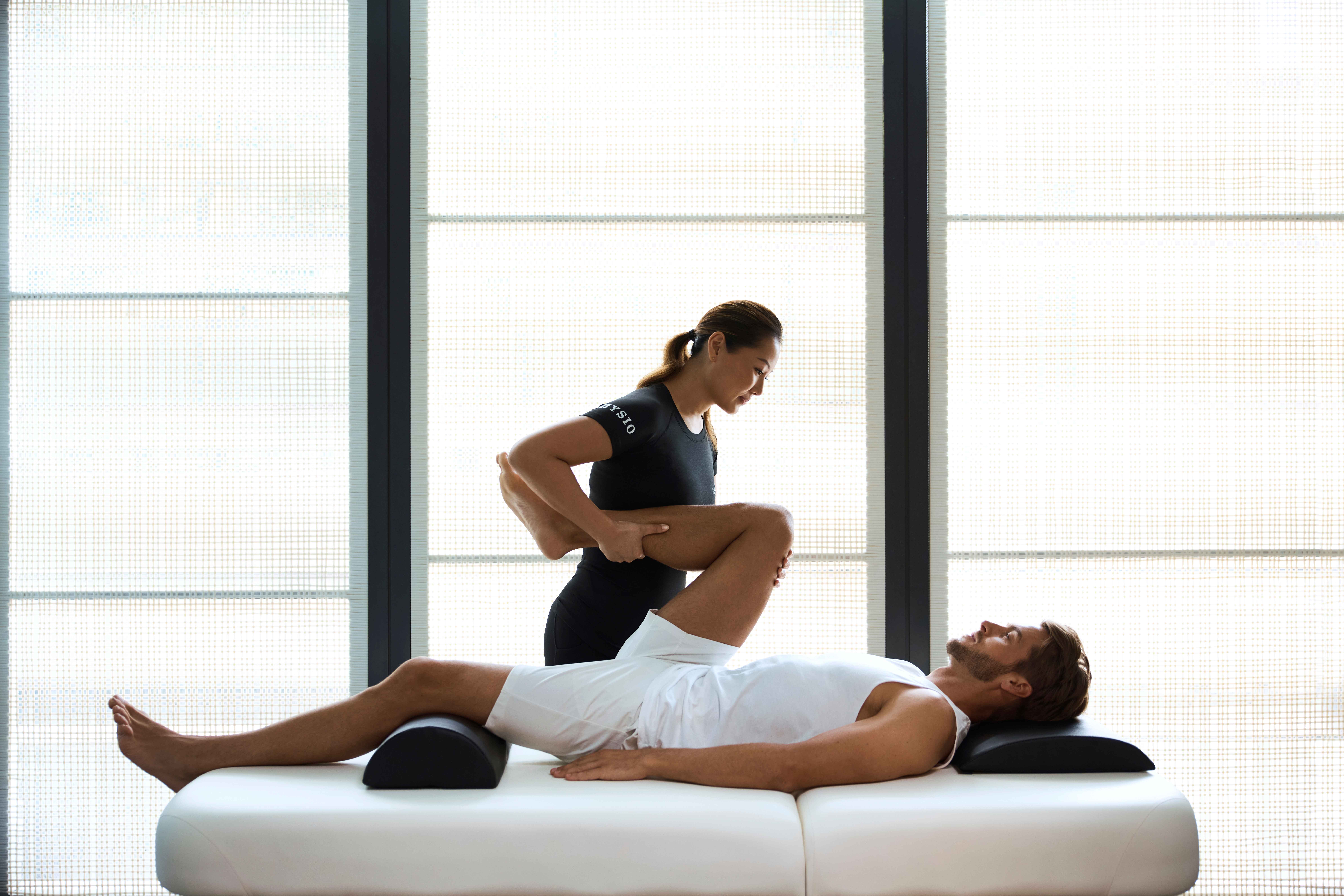It was my first body sculpting class in a room heated by infrared panels and boy, it was hot.
 Lindsay Jang conducting a Family Form sculpt class in an infrared-heated room
Lindsay Jang conducting a Family Form sculpt class in an infrared-heated room
At one point, a classmate noticed my struggle and offered to exchange places. I also stepped out midway for fresh air. My perseverance to the end of the 55-minute Family Form workout was greeted with affirmation all around, including from the class instructor and Family Form co-founder, Lindsay Jang.
It was not a workout for the faint-hearted, but doing it in a swanky suite — the Andre Fu-designed The Upper House in Hong Kong, no less — with a friendly tribe to boot was motivating. The hotel had converted several suites during the pandemic to house wellness residencies, including Family Form’s stretch and sculpt workouts, and it is proving to be a winning formula in generating returns on hospitality real estate.
 Raffles London Movement Studio
Raffles London Movement Studio
It makes business sense for The Family Form’s Jang too, who is also a restaurateur behind trendy izakaya concepts such as Yardbird and Ronin in Hong Kong, and a wellness influencer. She explained: “Rather than investing resources in a standalone studio, we can leverage The Upper House's esteemed reputation, prime location, and existing clientele to offer our method to a discerning audience who value luxury and wellness. Aligning with them also gives us access to their world-class facilities and services, which enhances the overall value proposition for our customers.” Nutritional nosh is part of the deal. After a workout, head to the hotel’s 49th floor Mediterranean restaurant Salisterra to enjoy a Family Food menu of protein and fiber laden salads and smoothies by a window seat with panoramic city views.
According to the Global Wellness Institute’s 2023 report, the global wellness economy grew 12 per cent annually since 2020 to reach US$5.6 trillion in 2022. The growth is expected to accelerate at 8.6 per cent annually until 2027. Collaborations between luxury hotels and beauty brands, such as Guerlain and Christian Dior, are not new, but have been mostly confined to spa offerings. With consumer trends moving towards holistic well-being and experiential travel, hospitality players are jostling to attract the well-heeled, health-conscious traveler with programs that cover all aspects of wellbeing from inside out, including rehabilitation, strengthening and food.
(Related: Work hard, stress less)
 Harry Jameson and James Atherton
Harry Jameson and James Atherton
The Upper House’s general manager Kristina Snaith-Lense said: “Today’s travelers seek immersive experiences that nourish both body and soul, making partnerships like ours (with Family Form) increasingly relevant. By leveraging each other's strengths and shared values, we create a distinctive offering that resonates with our target audience, setting us apart from competitors.”
Pillar Wellbeing hitched up with Raffles London and Fairmont Doha to run movement and recovery programs driven by personalized metrics. It engaged celebrity chef-restaurateur Jason Atherton, who is behind Michelin-starred restaurants around the world including London’s Pollen Street Social and City Social, to be the culinary director of its Pillar Kitchen menu. Breakfast bites include shakshouka, toasts with options of peanut butter or avocado, and quick meals ranging from grab-and-go protein balls to wraps and salads.
Robert Jeffers, director of wellbeing at Raffles London at The OWO, said that the ultra-personalized approach is the way to go as “many of our guests and members lead very busy, frantic lives and understand that fitness and recovery is the key to combating stress and burnout. There's also a growing trend towards health-conscious travel, with more consumers seeking wellness experiences during their holidays than ever before, so a hotel’s holistic offerings are crucial.”
(Related: New era of holistic health)
Pillar Wellbeing’s membership club model fills a gap for guests looking for more than the average hotel gym. Its founder and CEO Harry Jameson said: “We can provide a wellness membership to the hotel guests that goes far beyond that of a ‘normal’ hotel gym to one that enhances the lives of those passing through or lingering longer in these two hotels.”
“The hotel model also means that we can keep classes small, alongside plenty of space to provide the highly personalised one-to-one attention—from the first wellbeing assessment all the way to training, recovery, mindfulness and nutrition support—that makes what we do so special,” Jameson adds.
Homegrown wellness brand Como Shambhala has gone beyond the usual yoga, pilates, facial, and massage treatments to be the only non-medical space offering four health-tech therapies under one roof in its largest flagship at Como Metropolitan Singapore. Besides hyperbaric oxygen therapy, ice bath cold therapy, infrared-light heat therapy, and a combination of the cold and heat treatments, it also offers physiotherapy services by Strength Clinic Academy that focus on areas like pain management and post-surgery rehabilitation, which is a rarity in hotel wellness spaces.
A spokesperson for Como Shambhala shared: “In recent years, there has been a surge in wellness trends ranging from nature-themed mindfulness retreats to the proliferation of digital health apps and gadgets, and more recently, a growing focus on rest and recovery technologies.” While holistic wellness packages were gaining traction, plans integrating various expertise and close monitoring for effective recovery were not common.
 COMO Shambhala Strength Clinic Academy Physiotherapy Assessment
COMO Shambhala Strength Clinic Academy Physiotherapy Assessment
“This collaboration enables clients to benefit from a comprehensive and personalized recovery plan that optimally utilizes shared resources, such as access to state-of-the-art gym equipment, patented health technologies like contrast therapy, and quality yoga and Pilates classes supporting strength and mobility training,” said the spokesperson. “Our clients can access detailed assessments and treatments for injuries, and as they progress towards returning to fitness or achieving a pain-free lifestyle, our integrated approach allows for seamless transitions, with physiotherapists guiding individuals to establish routines conducive to their health and fitness goals.”
With professional expertise and technology to reset, recharge, and recover in top-end properties, not just wellness-focused resorts, there is every reason to feel good and even better after an urban retreat.
Jameson pointed out: “Consumers are increasingly wellbeing-savvy and prepared to invest in their mental and physical health. There’s a shift in the consumer consciousness, particularly post-Covid, where optimized daily performance has become the goal, and the realisation that we can’t be reactive to our health — longevity is a key driver.”






 Lindsay Jang conducting a Family Form sculpt class in an infrared-heated room
Lindsay Jang conducting a Family Form sculpt class in an infrared-heated room
 Raffles London Movement Studio
Raffles London Movement Studio
 Harry Jameson and James Atherton
Harry Jameson and James Atherton
 COMO Shambhala Strength Clinic Academy Physiotherapy Assessment
COMO Shambhala Strength Clinic Academy Physiotherapy Assessment




 Back
Back
